Armada: Inside the world's biggest independent dance label
- Published
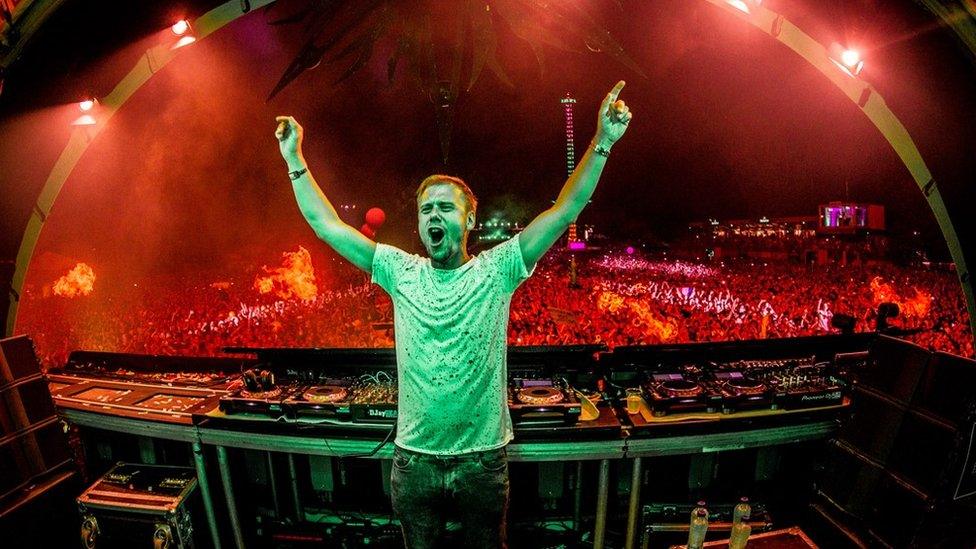
Armin van Buuren, Armada's co-founder, is the 10th highest-paid DJ in the world
In a drab Dutch office block, a few doors down from the local branch of Carpetright and opposite a crane dredging sludge from the Schinkel canal, lives one of the world's most vibrant and influential record companies.
Armada Music, co-founded by DJ Armin van Buuren, is one of the biggest independent dance music labels in the world.
Home to artists like Afrojack, Fedde Le Grand, Loud Luxury and Erick Morillo, its sales and streams are growing at an annual rate of 20% to 30% and it has been named best global label six times at the International Dance Music Awards.
"Armin van Buuren was lucky to partner with such professional, forward-thinking people when launching Armada," says Carl Loben, editor-in-chief of DJ Mag.
"Together, they've piloted the label through choppy waters and into the giant independent behemoth it is today."
So while those offices are dreary and grey on the outside, the interior is buzzing with life.
The first floor houses a radio studio, from which van Buuren hosts his globally syndicated show, A State of Trance. Next to the studio is an in-house club, where artists can road-test new music on a state-of-the-art sound system.
The decor is full of sleek lines and eye-popping detail, from the graffitied portrait of Amy Winehouse hanging next to the photocopier, to the immense wall of vinyl that lines the boardroom.
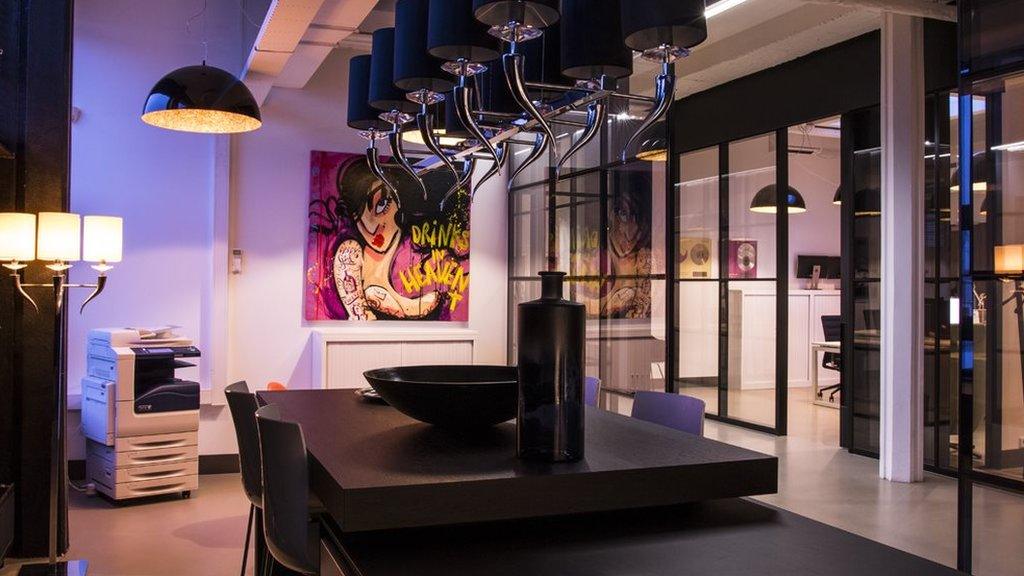
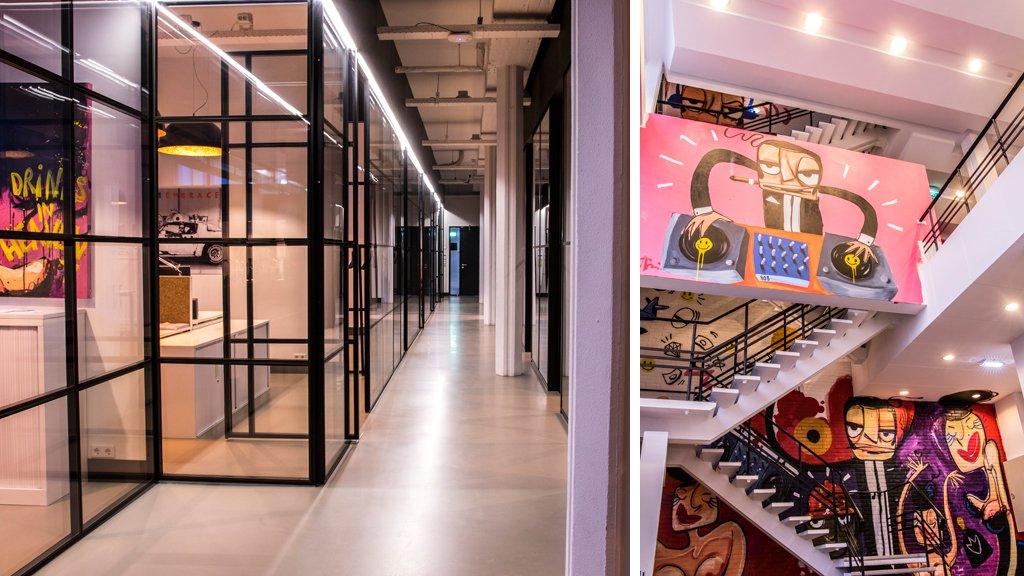
"It's a mix between work and a party office," says Felix De Laet, better known as chart-topping club act Lost Frequencies.
"Everybody is super-hyped about what is going on. So I always have a big smile when I walk in the door."
That's exactly the atmosphere CEO Maykel Piron wanted to create when he extricated himself from Warner Music in 2003.
"It was always my dream to have a real creative environment and not be like 'OK, this is a record label, we sign the contracts and that's it,'" he tells BBC News.
"I want artists to come and make our music at the offices. It gives them an opportunity to look into our 'kitchen' and, because of that, we might sign them quicker."
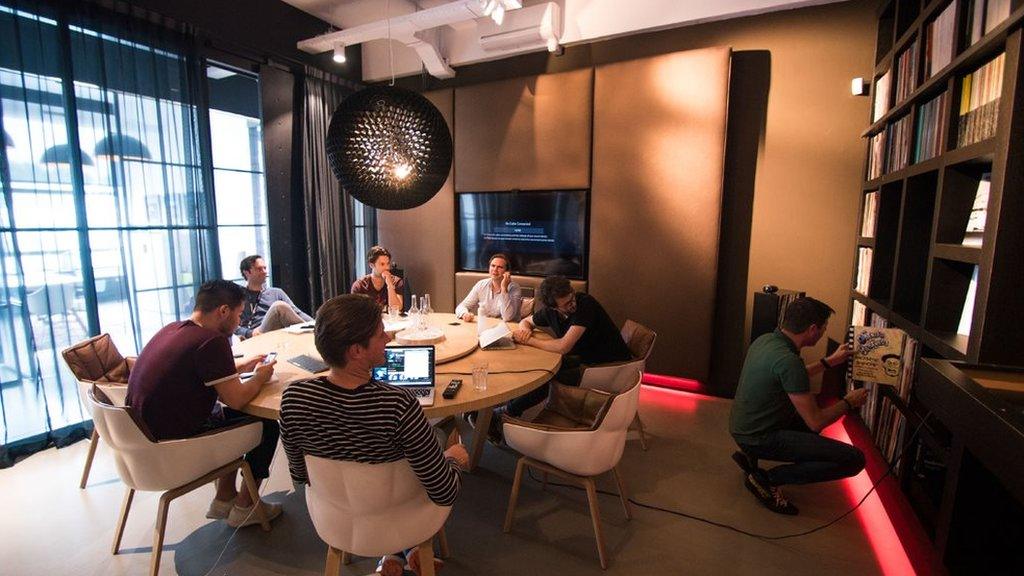
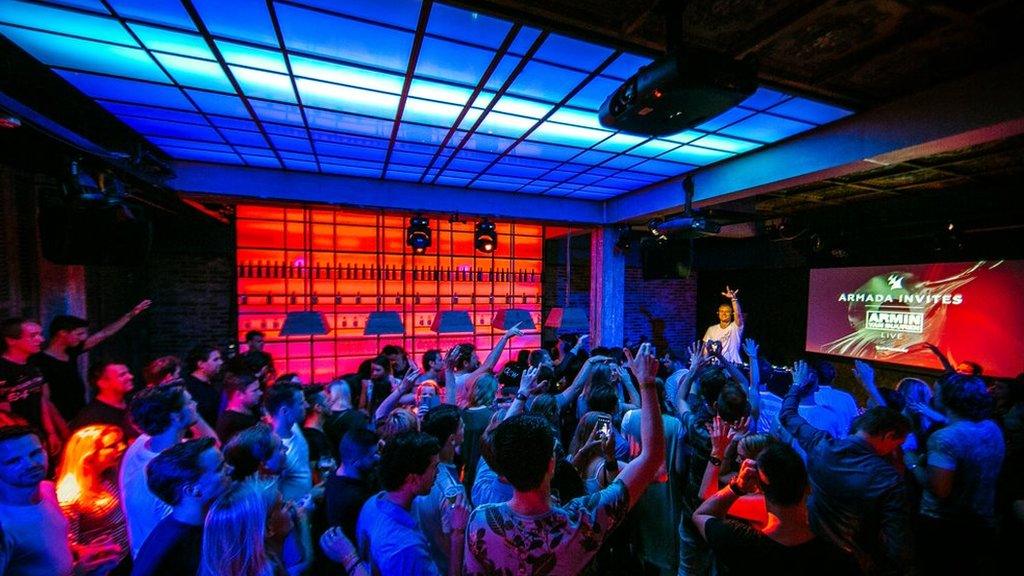
The story of Armada begins in Ibiza, dance music's spiritual home, in summer 2003.
Back then, van Buuren found himself in "a weird situation" with US house label United Records.
"They were more focused on house," he recalls. "I believed trance was the future for me."
Making matters worse, United had given him his own offshoot but were reluctant to release any of the new music he'd discovered.
"So I was at a point like, 'I'm sitting on this amazing pile of demos and I just want to release them.'
"And Maykel said in literal words: 'Well, I can do it myself and I can do it better.' And so we did it."
'One-man show'
Along with van Buuren's manager David Lewis, they launched Armada (an acronym of their names - ARmin, MAykel and DAvid) with Questia's pumping floor-filler Nexus Asia.
From the outset, it was van Buuren's passion that fuelled the label's success.
"It was like a one-man show," says Piron. "We had one of the most successful DJs in the world, doing his radio show and getting all those unsigned records, so we started building the company based on that."
Allow YouTube content?
This article contains content provided by Google YouTube. We ask for your permission before anything is loaded, as they may be using cookies and other technologies. You may want to read Google’s cookie policy, external and privacy policy, external before accepting. To view this content choose ‘accept and continue’.
But Armada had one more crucial advantage: timing.
In 2003, illegal downloading had ripped chunks out of the music industry and many independent labels simply gave up hope.
"They were saying, 'copyright is done' and 'there's no money in the music industry'," says van Buuren. "At the time that was true. It was very true."
Sensing an opportunity, Piron swooped in and snatched up the rights to "60 or 70 per cent" of all the "dance classics ever signed in the Netherlands".
Months later, Apple launched iTunes in Europe. Suddenly those "worthless" recordings became an asset.
"That was a very nice kick-start for us, because with those older titles we were able to fill compilation albums," says Piron. "One of those first compilations sold, like, 10,000 digital copies in a weekend.
"That was how we built the company. We were never financed by a bank, we did everything by ourselves and, because the money came in, I was able to hire more people."
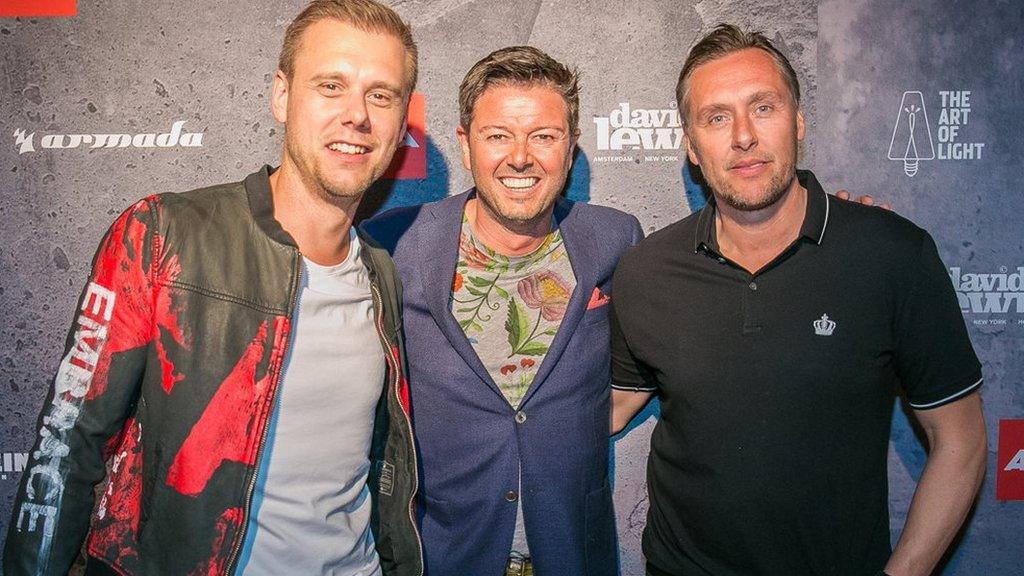
Armada's co-founders: (L-R) Armin van Buuren, Maykel Piron and David Lewis
Among them was Nadine van Bodegraven, who joined Armada in 2010 to run its legal and business affairs.
"At that time the department wasn't really as professional as the company was ready for," she recalls.
"One funny thing I ran into was someone [who] believed that if we didn't pay a remixer a fee, there would not be a need for a contract.
"I realised quickly there had to be a whole mindset change."
Having streamlined the department, van Bodegraven was promoted to chief operating officer in 2014.
Around this time the label had its big commercial breakthrough, with Lost Frequencies' Are You With Me, external and van Buuren's Grammy-nominated This Is What It Feels Like, external.
"Those were really global smashes and it all started to make sense," says the DJ.
Allow YouTube content?
This article contains content provided by Google YouTube. We ask for your permission before anything is loaded, as they may be using cookies and other technologies. You may want to read Google’s cookie policy, external and privacy policy, external before accepting. To view this content choose ‘accept and continue’.
This Is What It Feels Like was also Armada's first crossover hit in America - a major feather in the label's cap.
"It's very complicated to chart with a dance record in America," says Piron. "In the UK you go to the BBC and Kiss, and that's basically it.
"In America, to have a shot on pop radio, you need to start hiring teams in Ohio, in LA, in Arkansas - so you are working with 40 promoters to just push one song.
"But then you can get to the point where you have 5,000 radio plays in one week, which is a little bit more than anywhere else in the world.
"So to sign a record and get it to the Billboard chart is very unique. I love it."
Piron's boundless enthusiasm both permeates and defines the company.
"His mood is enjoying life, trying to take the best out of it, and that's the feeling you have when you go into the label," says Felix De Laet.
"Everybody's there having a good time, working for Armada and making the best out of it."
That's why they installed a nightclub inside the headquarters, putting on shows for 150 fans and staff almost every week.
"For the fans, it's free and fun and unique; and for the team, they feel like 'Wow, this is the new music we are going to release' and it's really exciting."
Many of those gigs are live-streamed, just like van Buuren's radio show, as the company stretches the definition of a traditional record label.
"It's one of the benefits of being independent, I believe, to make your own rules," says van Bodegraven.
"Dance music itself is rooted in the clubs, a little bit in the underground - it doesn't fit in a major structure. It needs quirkiness, and we cater to that very well because that's our DNA."
Allow YouTube content?
This article contains content provided by Google YouTube. We ask for your permission before anything is loaded, as they may be using cookies and other technologies. You may want to read Google’s cookie policy, external and privacy policy, external before accepting. To view this content choose ‘accept and continue’.
As the company goes from strength to strength, it's opened offices in New York and London, broadening its remit from the trance sound van Buuren was chiefly known for.
It's also looking to expand into Brazil, Argentina, India and China. But wherever it ends up, Piron adheres to one golden rule.
"Maybe I'm old-school, but I believe still that the best relationships come if you people can look you in the face and know that you are excited.
"This is what I teach the millennials now: if you really want to sign an act, pick up the phone, go and have dinner, get to know each other. This is how you get deals done."
In a world of music that's dictated by streaming algorithms and isolated listening, community is Armada's secret weapon.
"As much as the charts might be dominated by urban music, the clubs will always play higher tempos because people want to dance and experience that vibe." says van Bodegraven.
"So aside from everything that's happening on the radio, there's always the clubs - and clubs are where we are rooted."

Follow us on Facebook, external, or on Twitter @BBCNewsEnts, external. If you have a story suggestion email entertainment.news@bbc.co.uk, external.